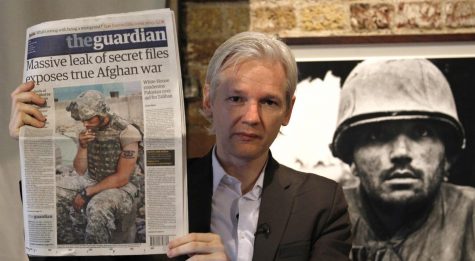Julian Assange is Removed from an Ecuadorian Embassy
Apr 17, 2019
This past Thursday, April 11, the Australian-born founder of WikiLeaks Julian Assange was arrested and forcibly removed from the Ecuadorian embassy where he had been holding asylum for seven years. The removal took place at 9:15 A.M. local time when police were invited into the embassy and Assange’s asylum was removed on counts of bad behavior and a blatant disregard for embassy policies.

Julian Assange being carried out of the Ecuadorian Embassy in London. His arrest poses many questions about the future of journalism.
The arrest was in response to a US request for his extradition, a handoff between police agencies in which the UK police gave US agencies Assange. Assange is facing one charge of conspiring to steal military secrets in a deal with former military analyst and whistle-blower, Chelsea Manning. The two have worked together before and, in total, Manning has given the WikiLeaks organization just shy of 750,000 thousand documents relating to the Iraqi war, the Afghan war, state department cables (a type of classified message between diplomats) and others.
Other whistleblowers, strong advocates of public knowledge of government information, such as Daniel Ellsberg, who released the Pentagon papers, and Edward Snowden, who released information on NSA civilian watcher programs, have called Assange’s arrest, “a dark moment for press freedom.” However, his critics are quite happy and claim his arrest, and hence inability to review and release sensitive documents, reduce national security risks.

This image of Assange from 2010 shows a front page story on the release of the Afghan war documents. It was considered the largest release of US military intelligence at the time.
Who is Julian Assange?
Julian Assange is an Australian born hacker and ‘politician.’ He gained notoriety in 2010 in which the organization and website he founded, WikiLeaks, released what was considered the largest dump of classified US military documents at the time. They related to the Afghan war and revealed what the war was truly like.
In more recent years he and his organization worked to expose premeditated favoritism of Hillary Clinton over Bernie Sanders by the Democratic National Committee. Wikileaks released nearly 20,000 emails from committee members and a large cache of emails from one of Clinton’s close aides.
What does this mean for journalism?
Assange’s arrest poses questions about the field of journalism: seeing as many regard this arrest as the only way to lock Assange up for releasing government secrets, what separates this administration from Russia in locking up journalists? Would Assange’s publishings even count as journalism? And if this really is just the government locking up agencies for releasing government documents, what distinguishes the Washington Post and the New York Times from WikiLeaks?
As the trial and this story develop seeing how the public and the media react to a possible stifling of free speech could set the precedent for either untethered journalism, a controlled press, or some middle ground that compromises between national security and public knowledge.






Duke ◊ Apr 17, 2019 at 1:11 pm
australians with computers are cool